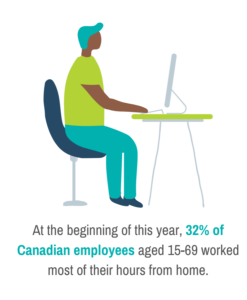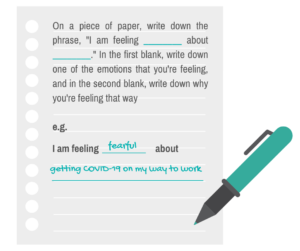Back To The Office: How To Maintain Your Mental Health
In all of 2020, and consequently, in 2021, the COVID-19 pandemic completely altered how employees worked their day-to-day jobs.

Turning the kitchen table into an office space was only a small fraction of the change employees needed to make in order to continue working for the next 18 months.
At the beginning of this year, 32% of Canadian employees aged 15 to 69 worked most of their hours from home, however, as Canada begins to loosen restrictions and open back up, more and more of these employees will have the opportunity to go back to their pre-COVID work life which has sparked both positive and negative reactions.¹
Whether excited to reunite with work colleagues or nervous to enter an office space that now feels unfamiliar, it’s important to focus on your overall mental well-being as a person—not just an employee.
Address Your Situation
Ask yourself why you’re feeling a certain type of way about going back to your office, or in some cases, getting back into the work field.
Recognizing and labelling your emotions can help pinpoint different stressors.

On a piece of paper, write down the phrase, “I am feeling ________ about ________.” In the first blank, write down one of the emotions that you’re feeling, and in the second blank, write down why you’re feeling that way (e.g. I am feeling fearful about getting COVID-19 on my way to work.)
Putting this thought onto paper can ease your mind of stressful and anxious thoughts and possibly lead to solutions.
Avoiding your emotions entirely can lead to the development of physical or mental health challenges, but accepting your feelings protects and promotes good mental health for not just yourself, but everyone around you.
There is no shame in how you feel.
Create Boundaries
If anything, the COVID-19 pandemic has taught us to distance from others—physically and socially—therefore getting back to an office packed with people can be very overwhelming and stressful.
To eliminate this kind of jarring experience, create some healthy boundaries.
- Limit social interactions indoors: Catch up with your co-workers in an outdoor setting. This can be outside on a park bench or taking a walk during your lunch break
- Take time for yourself: Continue to take breaks to step away from your work space. Just because you’re back in the office, doesn’t mean you shouldn’t take time to decompress to re-center.
- Don’t sacrifice your comfort: Especially when it comes to physical touch, some people aren’t as ready to embrace those who are outside of their close circles. If you are one of those people, politely let others know. Everyone in your workplace should respect where your comfortability is without judgement. Check out these wristbands that reflect physical proximity preferences according to colour.
- Be honest with yourself and your workplace: If the idea of going back is too worrisome, have an honest conversation with your supervisor about alternative work schedules, working from home, etc. Do not put yourself in a situation that you know will hinder your productivity, and more importantly, your mental health.
Since the onset of the pandemic, everyone’s overall mental well-being has been impacted in different ways. Remember to be kind and respectful to everyone that enters the office—you might not know what the last 18 months have looked like for them.
Encourage Change
Creating a mentally healthy workplace is an investment of time, resources and leadership, however, the outcome is worth it for the business and the employees.
If your workplace is lacking in areas of employee mental health wellness and health, encourage your employer to seek out opportunities, strategies, practices and solutions to support employee mental well-being.
Workplace Education Workshops
CMHA Calgary’s Workplace and Community Education Workshops are adapted to support the many Calgary and area employees who are working remotely from home.
Our top-quality, interactive workshops have been re-designed for engaging virtual delivery, featuring the key topics of “Stress Management and Healthy Coping” and “Mental Health Awareness.” These flexible workshops can be offered in 15 – 60 minute sessions, and are tailored to meet the unique needs of diverse schedules and work structures.
For further information on the topics offered, technology requirements, or to book a session please contact us at education@cmha.calgary.ab.ca.
Implementing Mental Health Programs
For grander changes, The Centre for Addiction and Mental Health (CAMH) is embarking on a journey to promote mentally healthier workplaces across Canada. In the following document, CAMH has added growing dialogue on workplace mental health by sharing evidence-informed and best practices and making recommendations for business leaders and other employers.²
Workplace Mental Health – A Review and Recommendations
Talking about mental health in the workplace is one of the small wins that has resulted from COVID-19. Although returning to the office is often an unnerving thought, it could mean discovering a whole new way to bring up meaningful mental health-based conversations with businesses, employers, and employees.
Every single person coming back to the office has experienced some sort of mental shift. Remember to be compassionate and realize that the grief and trauma triggered by the COVID-19 pandemic doesn’t only have a place at home.
¹Mehdi, Tahsin, Morissette, René. “Working from home: Productivity and preferences,” Statistics Canada, Last modified April 1, 2021. https://www150.statcan.gc.ca/n1/pub/45-28-0001/2021001/article/00012-eng.htm
²”Workplace Mental Health: A Review and Recommendations.” CAMH, Last modified January 6, 2020. https://www.camh.ca/-/media/files/workplace-mental-health/workplacementalhealth-a-review-and-recommendations-pdf.pdf?la=en&hash=5B04D442283C004D0FF4A05E3662F39022268149

Our Peer Support program services can be accessed over the phone at 403-297-1402 or through email at peer@cmha.calgary.ab.ca. We have teamed up with other Calgary agencies to help Calgarians quickly and easily access various counselling and social supports. Visit www.communityconnectyyc.ca, where you can book online for our Suicide Bereavement and Family Support Counselling, and other supports. If you prefer to still book through us, please phone (403-297-1708), or email (counsellingintake@cmha.calgary.ab.ca).
